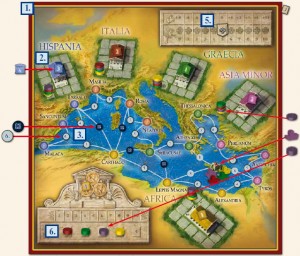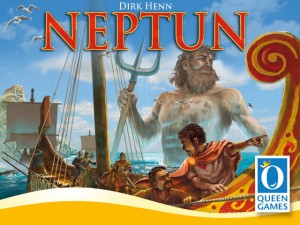Spiel 2014 Preview: Neptun
Posted by James (admin) on September 4th, 2014
 Dirk Henn was probably the first designer that I followed as Alhambra was one of the first euro board games I played and then I found I really liked his next games, such as Eketorp, Colonia, Shogun and Timbuktu.
Dirk Henn was probably the first designer that I followed as Alhambra was one of the first euro board games I played and then I found I really liked his next games, such as Eketorp, Colonia, Shogun and Timbuktu.
Over recent years, I’ve been disappointed that his games have been re-themes or re-releases of his previous designs; however, this year sees the release of a completely new game called Neptun which looks like a simple eurogame but with interesting game mechanics and a Roman merchant theme.
The game lasts 3 game rounds and each game round consists of 5 rounds of acquiring contracts followed by 5 rounds of fulfilling contracts.
Acquire Contracts
Cards are laid out in a grid with one row for each type of card (city cards, goods cards and oar cards) and one more column than the number of players. On their turn, a player takes 1 column of cards (one card of each type); however, there’s a neat game mechanic here to make things trickier.
A player can take any 1 of the face-up columns of cards (if there are any), or they can choose to reveal the next face-down column. However, revealing a column means they can no longer take any previous column – so their choice is now to take the newly revealed column, or reveal the next and take that, and so on. This adds an element of push-your-luck, plus the more columns you reveal the more information you give to other players.
When a player takes a column of cards, they must immediately assign the city and goods cards taken to one of the 5 positions in their order queue (the oar card goes into the player’s hand). Each city/goods card combination determines how many gold or temple points the contract is worth if delivered to the named city. However, the order is very important (see below) and players have to commit to the order before they know all of the cards they will get.
After players have each taken 1 column, the grid is re-filled and the player order changed based on the value of the oar cards taken. After 5 turns, players will have each taken 5 columns of cards and the game moves on to the Fulfill Contracts phase.

This player has filled their contract queue. The first contract (Alexandria) is worth 2 temple points at the yellow temple. (If the first goods card was green, the contract would be worth 2 gold.)
Fulfill Contracts
Each round, players first simultaneously play one of their oar cards. The amount of miles a player can move their ship will be equal to card’s oar value plus the current amount due to the wind (shown on the wind chart at top-right of the board). An extra game mechanic here is that each oar card also shows a wind value and the wind next round is set by the combined total of wind values played. This means you have information about the next round, can try to affect the wind to help you (or hinder others) and have some information on what the wind might be like in later rounds.
Players then take turns moving their ships and each route has the distance in miles required to travel along it marked on it. You can move extra miles by spending gold. Any miles not used during a turn are lost.
If a player ends his movement on a city where they have a contract, they can fulfill it to earn the gold or temple points shown by the city/goods card combination. However, when a player completes a contract, any contracts to the left of the one completed are discarded. So, you can skip contracts in your queue but they are lost.
At the end of the fulfilling contracts phase, players score VPs for having the most gold, for relative positions on each of the temple tracks, and earn a bonus of they completed 5 contracts that round. The player with the most VPs after 3 game rounds wins.
 Thoughts
Thoughts
Neptun looks like a solid and simple eurogame with some entertainingly difficult decisions and plenty of annoying other players by taking what they wanted. Not only do you need to try and get cards that you can deliver but you also need to consider a lot of factors when picking cards – the oar value for turn order and movement distance, other players’ standings at the temples, what type of reward the contract gives (gold or temple points) that will result in VPs, what contracts you already have in your queue and where they’re located.
There should be little downtime too as players are constantly involved each round and turns are quick. I’m not sure how it scales to 3 or 5 players as the rules I’ve seen only cover 4 players. The distance of each route is determined by tokens that are randomly assigned at the start of the game so these should add some variety in replay too.
Overall, Neptun sounds like the sort of light eurogame packed with decisions that I really enjoy.
You can read more info on Queen’s Neptun KS page here: bga.me/neptun
For more Spiel 2014 previews, check out my Spiel 2014 Previews page which lists the games on my radar with links to their previews too.
James.

